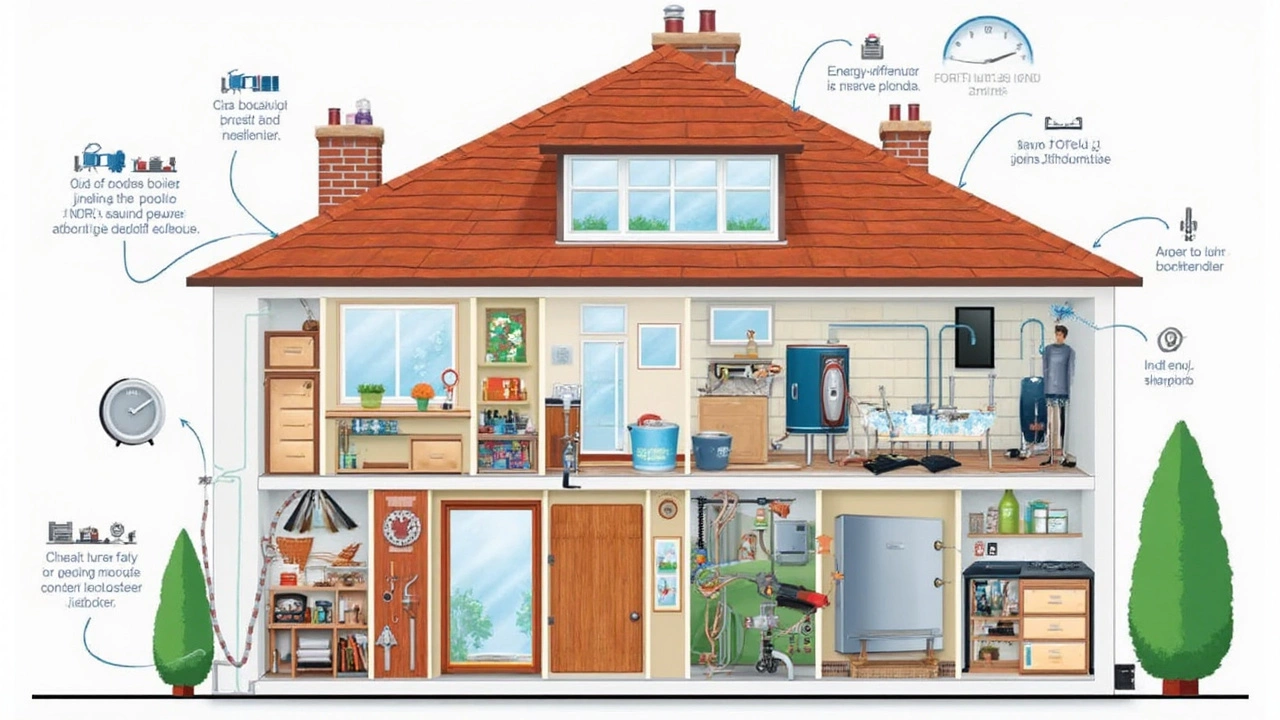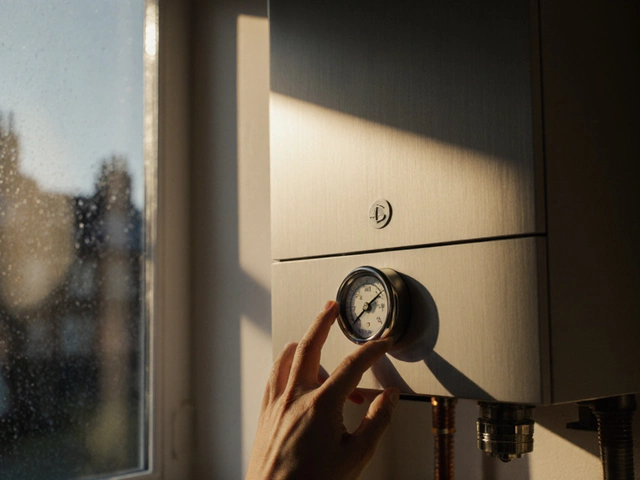If your old boiler is acting up or downright dead, you’re probably wondering how long you’ll be living without hot water and heating. Spoiler alert: most boiler swaps take between one and three days. But that number isn’t set in stone—there’s more going on behind the scenes than people think.
Some folks imagine it’s like swapping batteries. Just yank out the old unit and pop in the new one, right? Not quite. Even with a straightforward job, you’ve got to factor in draining systems, sorting out tricky pipework, testing, and making sure everything is up to code. Sometimes, getting the right permits or waiting for parts can throw a wrench in the schedule.
The quickest jobs are simple like-for-like replacements, same type and location. More complicated swaps, like switching from regular to combi boilers or moving the boiler somewhere else, usually take longer. And if your home’s got weird or outdated pipework? Yeah, that’s another potential roadblock.
Before any tools come out, good installers always inspect the site. They’ll look at access, gas connections, and if your radiators or controls need upgrades. Expect some mess—dust sheets, moved furniture, that sort of thing. And if you want to shave hours off the job? Clear out obstacles and make sure the boiler area is easy to reach.
- Why Replace a Boiler?
- Breakdown of the Boiler Replacement Timeline
- What Can Slow Things Down?
- Ways to Speed Up the Process
- Real-World Examples and Costs
- Tips for a Smooth Boiler Swap
Why Replace a Boiler?
Most people wait until their heating system completely fails before even thinking about boiler replacement, but there are lots of good reasons to do it sooner. Old boilers break down more often, costing you extra in repairs and leaving you without heat when you need it most. Safety is a major factor, too. Boiler leaks or faulty gas pipes can be dangerous—carbon monoxide poisoning is no joke, and old units are more likely to have hidden problems.
Another big reason? Energy bills. New boilers are up to 30% more efficient than models from 15+ years ago. That means you’re spending less every single month, which really adds up. With energy prices higher than ever, replacing an outdated unit can save some serious cash over time. If your boiler doesn’t have an efficiency rating label (look for ‘A’ ratings), it’s probably past its prime.
Sometimes, it’s not even about the age. If your boiler is noisy, slow to heat up, or keeps losing pressure, it’s on borrowed time. Replacing early is a smart move if you keep finding yourself calling the repair guy more than once a winter. Nobody wants to hunt down emergency service when it’s freezing outside.
There’s also better tech now—modern boilers come with smart controls, app connections, and are usually smaller and quieter. That means better comfort and convenience for you and your family. Plus, if you’re selling or renting out your place, a new boiler is a big selling point. Think of it as future-proofing your home.
Breakdown of the Boiler Replacement Timeline
So let’s break down the boiler replacement timeline, hour by hour and day by day. On paper, swapping a boiler should be quick, but reality packs a few surprises.
Here’s a quick look at the usual stages and roughly how much time each part eats up for a typical, straightforward replacement:
| Stage | Estimated Time |
|---|---|
| Assessment & Preparation | 1–2 hours |
| Draining heating system | 1–2 hours |
| Removing old boiler | 1–3 hours |
| Installing new boiler | 2–5 hours |
| Connecting pipes, gas, electrics | 2–4 hours |
| Testing & commissioning | 1–2 hours |
| Tidying up | 30–60 minutes |
Add those together and you get anywhere from 8 to 19 hours for a normal job, which usually means 1–2 days. Big changes—like moving the boiler to another room, switching boiler types, or adding smart controls—can push things out to 3 days or more.
Let’s unpack what actually happens at each stage:
- Assessment & Preparation: The engineer checks your setup, plans the job, and moves furniture if needed. This is also when they’ll spot problems that could slow things down.
- Draining the System: You can’t just pull the old boiler off the wall. Draining stops leaks and gets rid of the old sludge in your pipes.
- Removing the Old Boiler: Old bolts, rust, awkward positions, or stuck joints sometimes make this bit a headache. Most of the time, it’s not too dramatic.
- New Boiler Installation: Bolting the new boiler in place, attaching the flue, and making sure it fits exactly how it should.
- Connecting Everything: Linking up the pipes, gas, thermostat wires, and sometimes upgrading safety valves or pumps. If the wiring or gas line needs work, expect some delays.
- Testing & Commissioning: They’ll test for leaks, balance the system, and get the heating and hot water running smooth. This part’s not rushed—safety and performance count.
- Tidying Up: Most installers clean up after themselves, do a walkthrough, and answer any nagging questions you’ve got.
Actual time can swing a lot if your home’s old, the pipework’s a maze, or you have special add-ons like underfloor heating controls. On rare occasions, missing parts or surprise faults pop up, meaning the installer may need to return the next day. For most people, though, expect the heating to be back up the same day or by the following afternoon.
What Can Slow Things Down?
It’s easy to think boiler replacements are straightforward, but plenty of things can throw the brakes on the whole process. Here’s where homeowners get tripped up most often.
- Boiler replacement location: If your current boiler is tucked into a tiny cupboard or a hard-to-reach place, techs will need extra time just to access it. Awkward spaces mean more effort and creative thinking.
- System upgrades: Got old pipes, ancient radiators, or a setup that screams 1980s? Upgrading parts of your heating system or switching from a regular to a combi boiler adds hours—or even an extra day.
- Electrical work: If wiring isn’t up to scratch, you might need an electrician to update your setup before installation, leading to more delays.
- Gas supply issues: Modern boilers need a certain gas pressure. If lines are too narrow or outdated, the installer has to fit new pipes, which isn’t quick or cheap.
- Permissions and safety checks: In some areas, installers can’t start until the right permits land or safety checks pass. Unexpected hiccups in paperwork hold up the job.
- Delivery hiccups: Sometimes the new boiler or extra parts show up late. Not much anyone can do except wait it out.
Here’s a handy breakdown of what slows things down and by how much on average:
| Delay Factor | Extra Time Added |
|---|---|
| Access problems (tight space, moving location) | +4 to 8 hours |
| System upgrades (pipes, radiators) | +1 to 2 days |
| Electrical rewiring | +4 hours to 1 day |
| Gas supply upgrade | +1 day |
| Permit or paperwork delays | Varies, sometimes days |
| Late delivery of parts | 4 hours to several days |
Want a faster job? Clear access to your boiler area, make sure hallway and work zones are open, and check that your installer confirmed delivery—all before work kicks off. Missing these can mean you’re left in the cold longer than you’d planned.

Ways to Speed Up the Process
Nobody wants to be stuck without heat for days. But honestly, a lot about boiler replacement timing comes down to planning and having your ducks in a row before the installer even knocks on your door.
Here are a few things you can do to make sure everything moves as fast as possible:
- Clear the workspace. Move furniture, boxes, or anything else that could slow down the crew. Give them easy access to the boiler, pipes, gas meter, and fuse box.
- Decide what you want early. Don’t change your mind last minute about the new boiler type or its location. Make these decisions with your installer during the first visit.
- Sort out permissions. In some areas, you need a permit or paperwork. Ask your installer if they’ll handle it or if you need to start the process yourself. Delays here can freeze the job for days.
- Ask about parts. Make sure your installer has all the pumps, valves, and flue pieces ready to go. Special orders or missing bits can stretch a quick one-day job into something much longer.
- Discuss any add-ons upfront. If you're planning to swap radiators, add smart controls, or update the pipework, tell the installer before the quote. Surprises mean delays.
Want a smooth ship? Book your installer ahead of the busy season. Fall, especially, fills up fast, and you could end up waiting weeks just for a slot.
One last tip: keep your phone handy on installation day. If questions pop up or they need your okay for something, being quick with answers saves hours.
Real-World Examples and Costs
Cost and timing for a boiler replacement can be all over the map, depending on your home, what type of boiler you need, and how much work those old pipes need. Let’s get into some real numbers and actual scenarios so you know what people really pay and what their days look like.
On a standard street in Liverpool last winter, a family had their old combi boiler swapped for a modern one in the same spot. A two-man team did the job in under two full days, and the bill landed at £2,600 including VAT and parts—nothing extra needed.
Now, compare that to a semi-detached house in the Midlands where the owner wanted a new system boiler, moved it from the kitchen to the loft, and got some radiators upgraded. That project stretched to three days (with a little overtime) at a total cost of £3,900. The higher price mainly came from extra pipework and the fuss of shifting the boiler’s spot.
Londoners usually see a bump in costs due to higher labor rates. For example, one flat owner paid £3,400 for a straightforward like-for-like boiler replacement—same type, same place—done in just a day and a half with no surprises.
Here’s a quick look at what you might pay and how long it can take, based on recent quotes:
| Type of Swap | Average Time (days) | Cost (GBP) |
|---|---|---|
| Combi to combi, same location | 1-2 | £2,000 - £2,800 |
| System to combi, same location | 2 | £2,500 - £3,200 |
| Regular to combi, new location | 2-3 | £3,200 - £4,500 |
| Boiler plus five radiators | 2-3 | £3,500 - £5,200 |
Expect installers to toss in some extras, like a chemical flush or smart controls, for a bit more. Emergency or weekend callouts? That always adds a premium.
If your boiler’s really old, you could run into surprises—crumbling flue joints, clogged pipes, or ancient wiring. That can bump up your bill or add a day to the job, so keep a little wiggle room in your budget.
Tips for a Smooth Boiler Swap
No one wants their home to turn into a construction zone for longer than necessary. Here’s how to keep your boiler replacement on track, avoid delays, and maybe even save some cash.
- Clear the work area: Move any furniture, rugs, or stuff that’s in the way. Installers work faster and you won’t have odd stains or dings to fix later.
- Know your old boiler’s details: Jot down the make, model, and any weird stuff it’s done. That helps installers bring the right parts and avoids repeat visits.
- Get your home ready: Make sure pets are somewhere safe and kids don’t wander into the workspace. Some boiler components get hot, and tools everywhere are just accidents waiting to happen.
- Prep your heating controls: If you’re upgrading, ask about smart controls or thermostats the day before. Sometimes integrating new tech takes an extra hour if you don’t plan ahead.
- Ask about cleanup: Not all installers sweep up the mess or take away your old boiler. Clarify this before they start.
- Have questions ready: Good installers want you to understand your new boiler. Ask about basic operation, routine maintenance, and warranty registration before they pack up.
According to a big survey run by Boiler Guide UK, about 85% of straightforward boiler swaps are done in under two days. But complicated jobs—moving the boiler, adding new pipework—can stretch into three or four days.
| Boiler Swap Type | Avg. Time Needed | Common Add-Ons |
|---|---|---|
| Like-for-like (same location/type) | 1–2 days | Powerflush, thermostat upgrade |
| Change of type (e.g. system to combi) | 2–3 days | Pipework alteration, filter install |
| Relocation (move new boiler elsewhere) | 2–4 days | Wall making-good, extra flue work |
One more pro tip: get your boiler serviced yearly after the swap. The first year’s usually included for free, and regular checks keep your warranty valid. That way, you won’t be surprised by weird breakdowns right when you really need the heating on. If you have a gas supply shutoff for the install, plan meals or hot showers around it—no sense in a cold dinner or freezing morning if you can avoid it.




